It is a drab Thursday afternoon and Tánaiste and Minister for Foriegn Affairs Simon Harris has returned to his first floor office at Government Buildings, following a UK-Ireland summit in Liverpool that morning.
I have just asked him if he would like to visit Israel at a time when the diplomatic relations between the two countries are at rock bottom.
The answer is unequivocal, yes, but Mr Harris then entered a caveat.
He said that any visit should take place "at the right time" where there had be an opportunity to have what he termed "meaningful engagement".
Despite the tempering, this is a statement of intent.
The Tánaiste and Minister for Foreign Affairs and Defence wants to go to Israel and would also like the Israeli Embassy in Ireland to reopen.
"We as a Government, we as people, want to have good relations with the State of Israel" was how he phrased it.
However, Mr Harris added: "We also have to be true to who we are as a people ... who believe passionately in a two-state solution and we believe that's the best way of bringing about peace, security and stability to the [Middle East] region is just that."
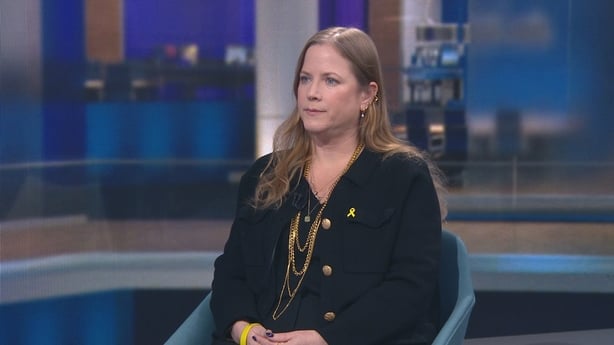
It is a notable remark given that Opposition parties in the Dáil had been calling on the Coalition to expel Israeli Ambassador Dana Erlich before her government decided to pull the plug on its presence in the State.
Sinn Féin, the Labour Party, Social Democrats, People Before Profit and Aontú all castigated the coalition last year for failing to enact the Occupied Territories Bill in the face of what they claimed was Israel's genocidal campaign in Gaza against Palestinians.
Mr Harris seems to be signalling a somewhat different approach to those parties.
Still, the diplomatic gulf between Dublin and Tel Aviv is vast.
Before leaving Ireland last December, Dana Erlich told RTÉ News that her country does not think that the Irish Government's criticism of its policies is antisemitic, but she believes that Ireland's "actions" have strayed into that territory.
"When you break down the different criteria under that definition, unfortunately, the actions and rhetoric of Ireland have become antisemitic," she said.
When I put that incendiary accusation to the Tánaiste, he replied: "I deplore antisemitism. Antisemitism is on the rise across the world and we're not immune to that risk here in Ireland. We absolutely have to do everything we can to fight antisemitism."
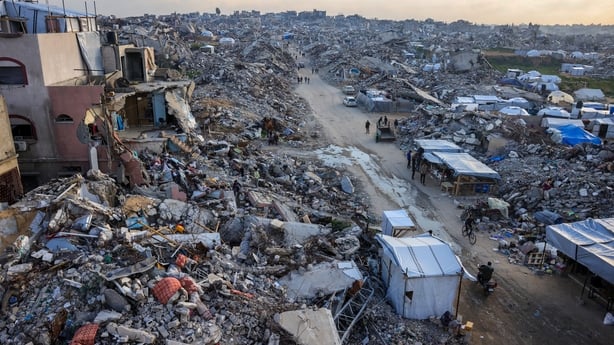
Then he continued: "There's a very big difference between legitimate criticism of the policies of a government and deplorable disgusting acts that amount to antisemitism.
"And I have great clarity in my mind as to the difference. I think the people in this country do as well."
Ireland's vocal advocacy for a Middle East peace agreement, involving the establishment of a Palestinian State which co-exists peacefully with Israel, has meant there's always been a degree of tension in its relationship with successive Israeli governments.
However, the Hamas massacres on 7 October 2023 and Israel's military response in Gaza led to a breaking point.
The fissures were noticeable as early as the following month, with TV images from Gaza revealing pancaked apartment blocks, dire scenes at hospitals and mass burials.
Then taoiseach Leo Varadkar condemned Israel's military operation, called Swords of Iron, stating it "... resembles something more approaching revenge".
As Israel continued to prosecute its war, and the death toll continued to mount in Gaza, the Irish position hardened exponentially.
Ireland, Spain and Norway formally recognised the Palestinian State the following May.
In October, the then tánaiste Micheál Martin declared his government would pass the Occupied Territories Bill, banning trade between Ireland and illegal settlements in the occupied Palestinian territories. [It's still not passed though.
The following month, Ireland said it would abide by a ruling of the International Criminal Court (ICC), which issued an arrest warrant for Israeli Prime Minister Benjamin Netanyahu and former defence minister Yoav Gallant.
In December, Israel closed its embassy, decrying the Irish Government for engaging in anti-Israeli policies.
Working towards any concord between Ireland and Israel is going to be difficult, despite a ceasefire in Gaza.
The crux of the problem is the response of the Israeli Defence Forces (IDF) to the Hamas massacres of 7 October, which ultimately led to Ireland joining South Africa’s genocide case against Israel at the International Court of Justice (ICJ).
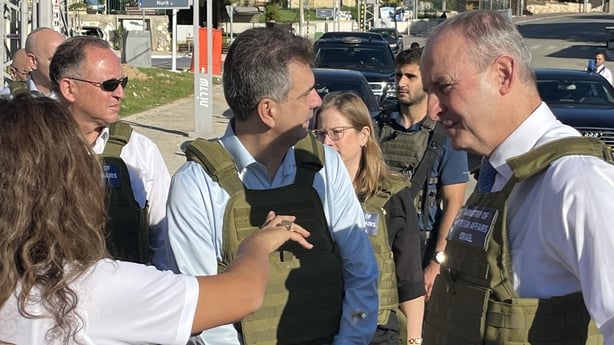
Irish politicians have repeatedly and emphatically condemned Hamas, but Irish diplomats feel it has not always registered in Israel.
The Tánaiste was forceful again this week: "I believe that Hamas offer no future to the people of Palestine in any way positive. I think they're a despicable, disgusting illegal terrorist organisation that carried out a horrific, horrific, terrorist attack on the people of Israel."
The difficulty arises, for the Israeli government and many of its citizens, when Ireland advocates an approach in line with international law.
According to the International Committee of the Red Cross, this principle prohibits attacks against military objectives which are "expected to cause incidental loss of civilian life, injury to civilians, damage to civilian objects, or a combination thereof, which would be excessive in relation to the concrete and direction military advantage anticipated".
I spoke to Israelis on the streets of Tel Aviv, in the week after the Hamas massacres, about this principle of proportionality.
One man said to me: "So you want Hamas to survive so that they can kill us again?"
Micheál Martin came face-to-face with that view when he visited the southern Israeli town of Sderot in November 2023 as tánaiste and foreign minister.
More than 40 people had been massacred there by Hamas the previous month, including a dozen older people shot dead while sitting on a tourist bus.
Local Mayor Alon Davidi said his town had been under constant rocket barrages by Hamas for years, a fact, he asserted, which had been ignored by the international community.
The massacres of 7 October, he declared, had to be a point of no return, a defining moment.
"We must finish the job. If you stop us, they [Hamas] will destroy us - you and everyone ... I am begging you and I ask you, support Israel," he implored Mr Martin.
Dana Erlich feels that the lessons of 7 October have not been learned in Ireland.
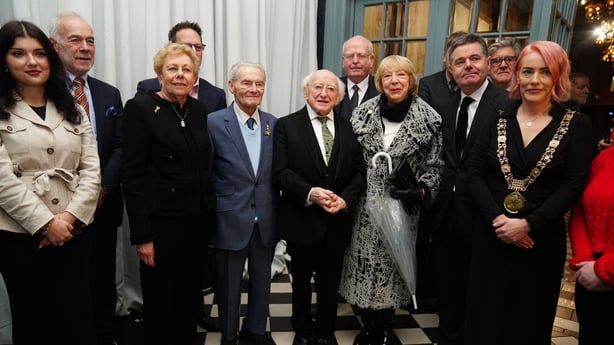
She told me this week: "Instead of realising that the October 7th attacks were the beginning of a massive campaign against Israel, in military and propaganda terms, it [Ireland] has fallen into a trap of absorbing an extreme anti-Israel narrative, thereby becoming a tool of those who seek to damage the state of Israel."
The Tánaiste Simon Harris says he endeavours to understand "... that sense of fear, trauma and insecurity that an Israeli civilian can feel living in an area where they've been targeted by terrorist organisations."
Yet he strongly believes the military response from the IDF could be "much more forensic, much more targeted, much more focused".
"The innocent people of Gaza, the innocent people of Palestine, particularly the children, they're not terrorists ... they're human beings that have a right to live in their homeland," he insisted.
At the same time, the Tánaiste recognises that the absence of an Israeli Embassy in Ireland is a cause of concern within the Jewish community in Ireland.
He told me: "I do know that it's been a very difficult and challenging time for them - I'm conscious of that. I had a very good meeting with a representative of the Jewish Council recently. I want to have more engagement."
I put it to Mr Harris that one of the Jewish community's concerns was the repeated, albeit small, presence of Hamas and Hezbollah flags at demonstrations in Dublin, even though both organisations are deemed to be terrorists by the EU.
Could he do something about that?
"I need to reflect on the laws here, in terms of what is and isn't allowed. But I certainly provide no time for anybody that waves the flags of any terrorist organisation," he stated.
The Tánaiste stoutly defended President Michael D Higgins against criticism for his decision to reference the war in Gaza while addressing the Holocaust Memorial Day Commemoration in Dublin, which was marking the 80th anniversary of the liberation of Auschwitz.
Several protesters walked out of the event in the Mansion House, and one was removed by the event's security team, after President Higgins stated he hoped the families of those killed by Hamas militants, hostages waiting for release, and the thousands searching for loved ones buried in "the rubble of Gaza" would "welcome the long-overdue ceasefire".
Dana Erlich said that day that it was "troubling" that the President had chosen to "politicise" such a unique event by "very predictably admonishing the State of Israel".
This week, Simon Harris asserted that President Higgins did not say anything at the event which was "out of line" with the Irish Government's position.
Where the Tánaiste and the Israeli Ambassador were in agreement was questioning the decision to eject a protestor.
"That's not Ireland, that's not who we are, I don't stand over that at all," Mr Harris said.
The Tánaiste was also in-step with the Israeli Ambassador when he condemned Hamas recently "parading" the coffins of Kfir and Ariel Bibas, who were just nine months and four years old when they were violently abducted, along with their mother Shiri.
"Utterly despicable" was how Mr Harris phrased it, adding: "We know better - more than most nations - what it's like to have a terrorist organisation trying to hijack your national identity."
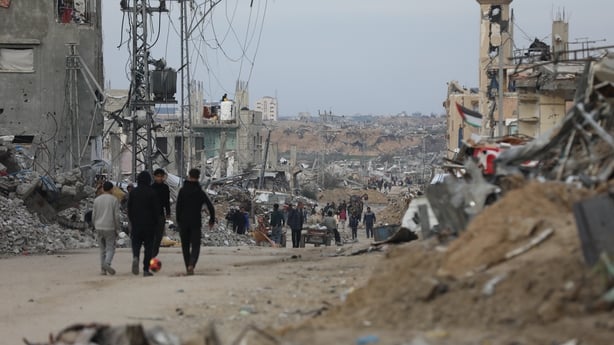
Yet, Israel remains unconvinced of Ireland's bona fides.
Dana Erlich told me on Thursday: "Ireland has sacrificed the potential for mutually beneficial bilateral engagement between our countries in favour of taking punitive actions against Israel whilst failing to hold Hamas accountable or responsible for the current war."
"Sadly, we have not seen yet a process of reflection yet on the actions and rhetoric towards Israel in Ireland, which is required for any future change," she added.
That position is not too much of a surprise, given that Ireland has joined South Africa's genocide case at the ICJ, supports the ICC extradition requests and condemns the IDF's ongoing military operations in both Gaza and the Occupied West Bank.
What could lead to the beginnings of a rapprochement between Ireland and Israel is if the current shaky ceasefire in Gaza morphed into some form of substantive peace talks.
Mr Harris described the need for such a process as "the most important thing" given the "really really serious" situation in the coastal enclave, where 2.3 million Palestinians live in dire straits.
He said, even now, the world does not have "a proper, comprehensive understanding" of either the death toll or the extent of the humanitarian crisis facing Palestinians.
Opposition politicians in Ireland are keeping up the pressure on the Government to take a harder line on Israel over its war in Gaza.
For example, Independent Senator Alice Mary Higgins has written to Ministers travelling to EU capitals for St Patrick's Day celebrations calling on them to lobby for a review of the EU-Israel Association Agreement, which affords Israel certain trade privileges.
She declared in a letter: "The previous and current actions by Israel in cutting off access to food, electricity and water for the civilian population of Gaza are breaches of international law and are in themselves grounds for suspension of this agreement."
Ireland's diplomatic relationship with Israel will continue to walk a tightrope.
The Tánaiste said this week that it is "always good to engage" and, referencing the closure of the Israeli Embassy, he added: "I hope over time that the Israeli government may reverse that decision."
My guess is that neither side thinks that's likely to happen any time soon.







